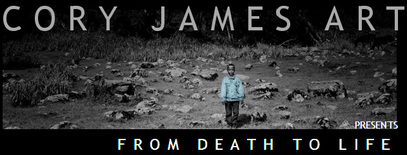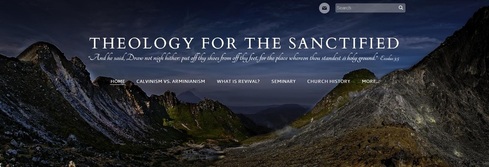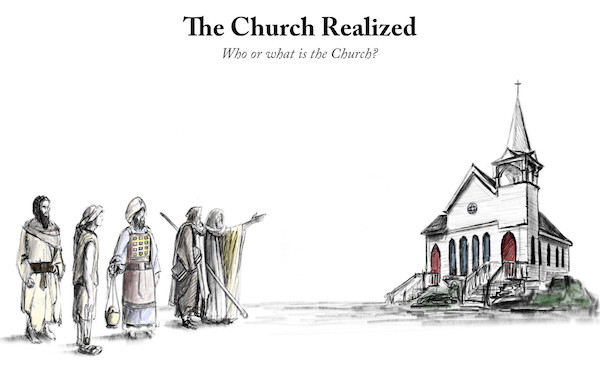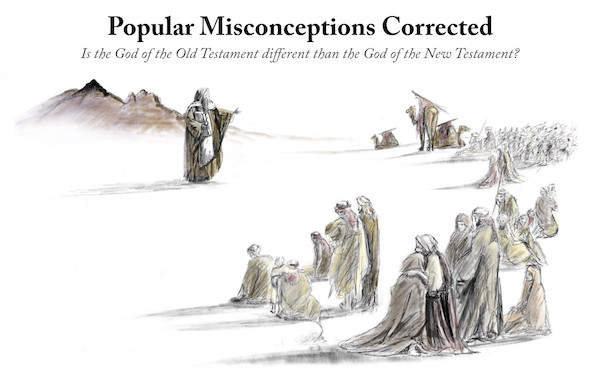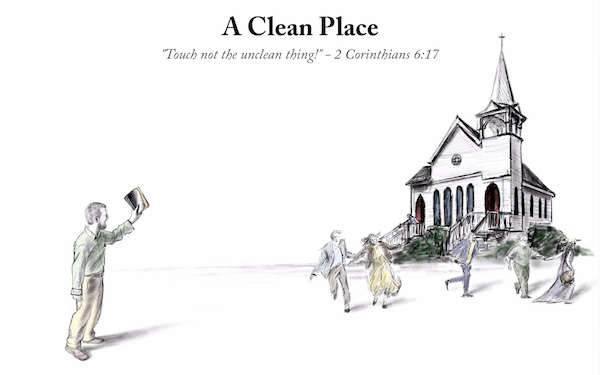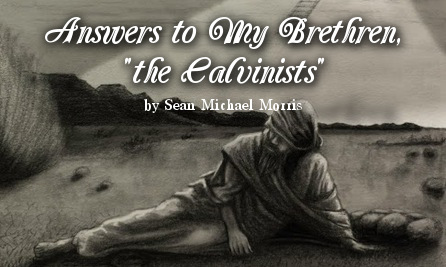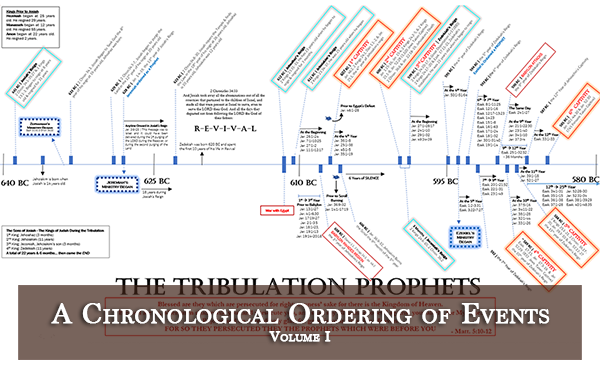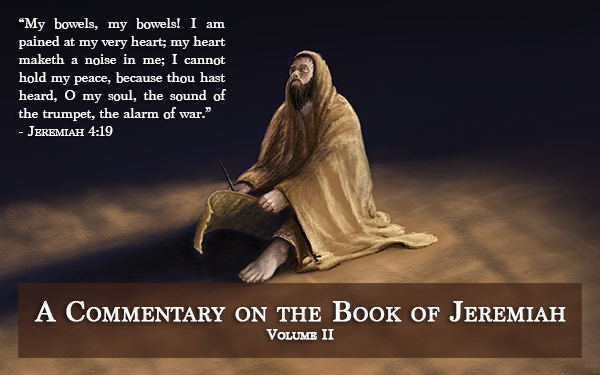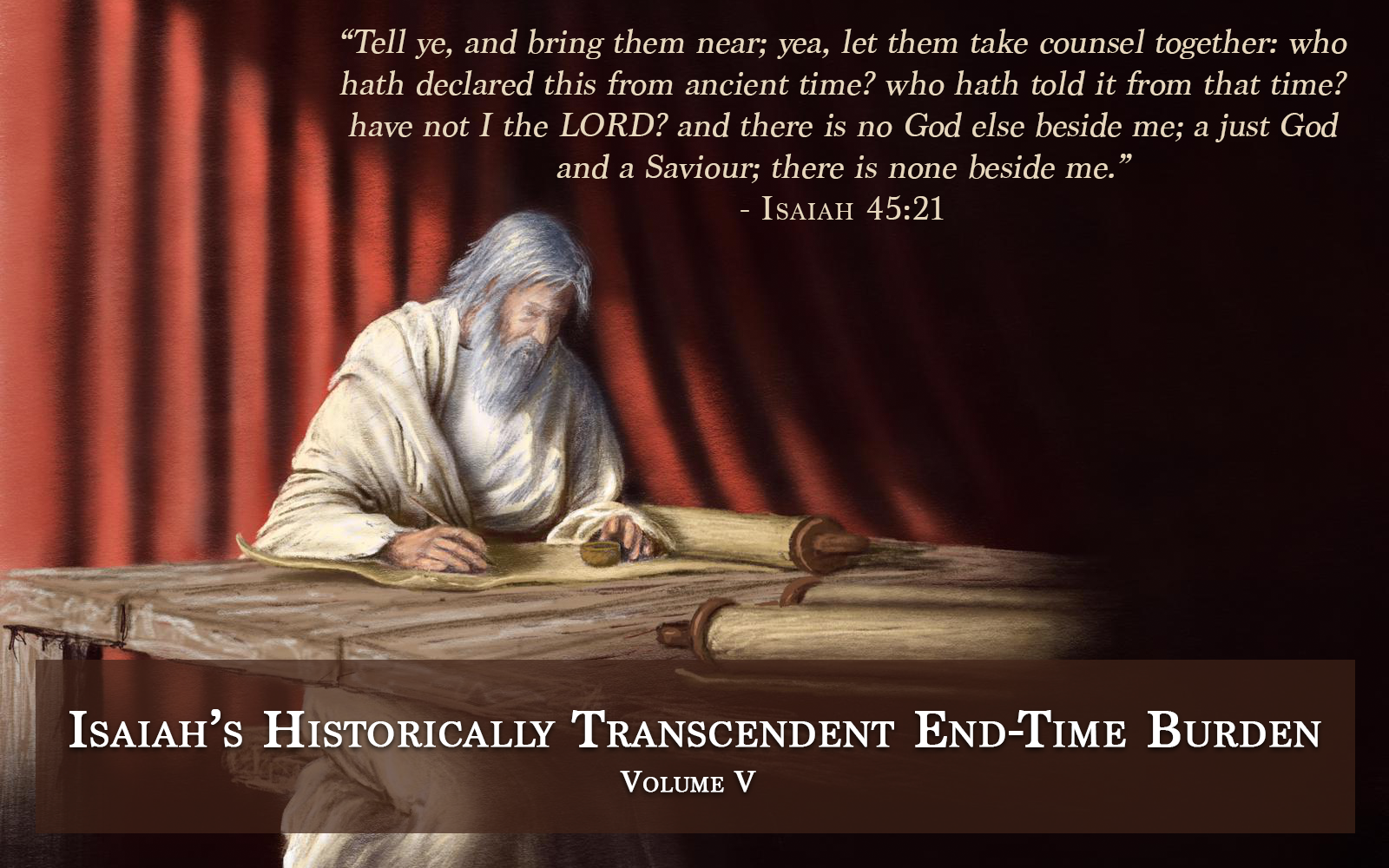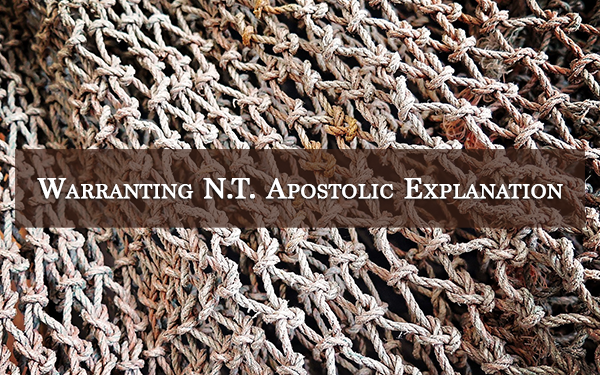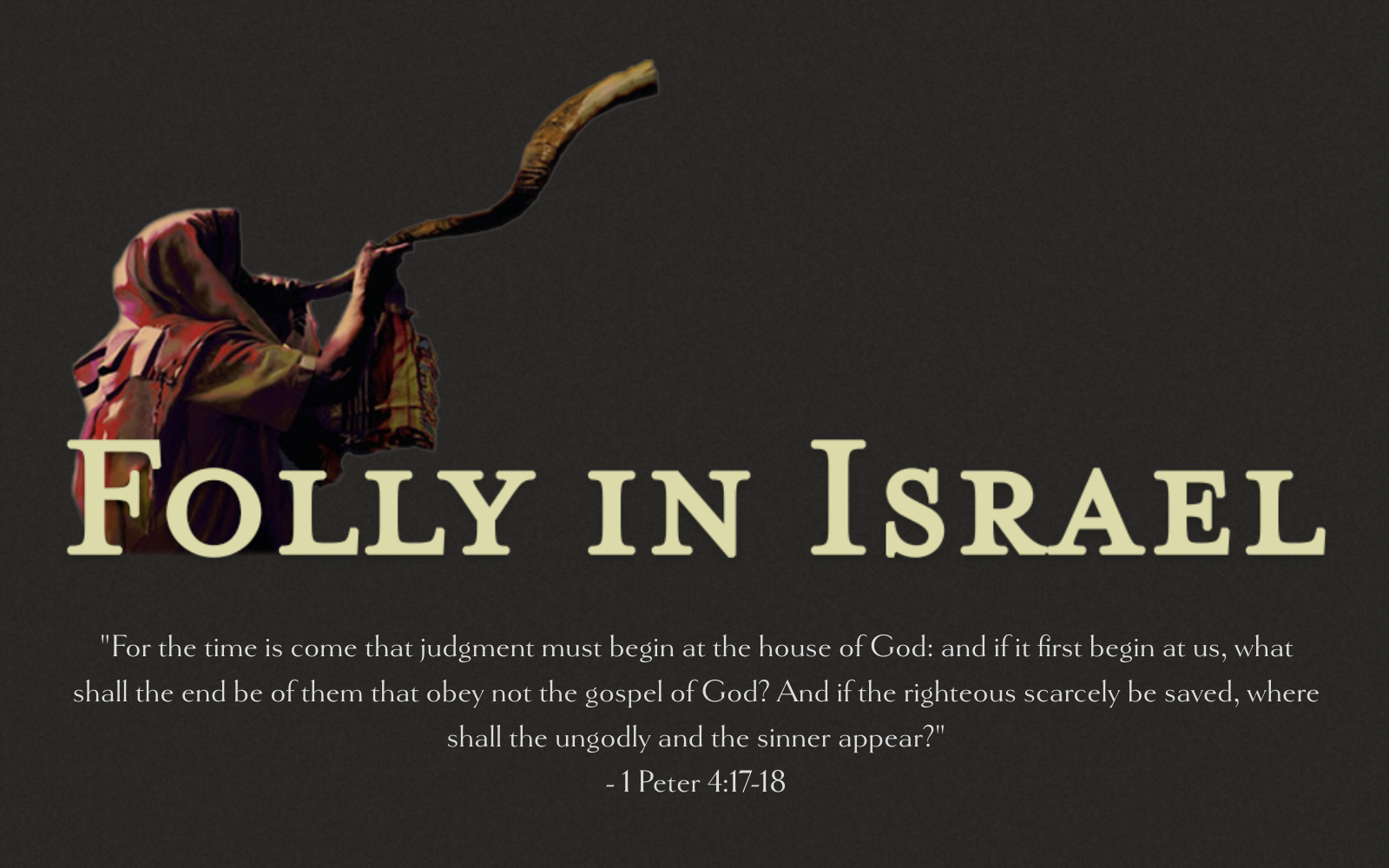God commands Christians to judge Christians - will you believe it? The exact word “judge” is used in the biblical teaching, and an entire chapter is devoted to it - this shows its necessity and vitality. This section is called “NT Corporate Judgment” because Christians are the corporate body of the true Church, and God requires a corporate holiness and sanctity to be represented by this body. To keep the corporate body of the Church pure and holy, judging whether persons are pure or impure must be done. It is impossible to keep a Church pure from persons who are impure, if there is no biblical means to judge purity. This is the plain point of the matter. I feel that it would be a detour from the immediate burden at hand to exposit the details of this chapter and the vast amount of NT instruction regarding Church purity, but please, let me press upon your mind the clear claims of scripture! I pray that God would not leave you alone, that He would break your pride and bow down your head to His word as the final judgment – that Christians judge Christians.
Oh professing Christian, do you not want to be judged? You have signed up for it! This form of judgment is for those who take upon themselves the honorable and privileged name, Christian. If you take it upon yourself to bear and represent God’s name in this earth, an earth full of people that know Him not, you had better represent Him rightly! And when you don’t, you better be ready to be confronted, corrected, and judged for your deeds which distort and profane His holy Name. Let a man injure another man’s name, but when a man injures God’s name before the public eye, he injures EVERY MAN! To injure the Name of God is to make odious man’s only eternal lifeline. Nothing is more important to God than His Name! My reader, God hath said: “How should My Name be polluted” (Isa. 48:9-11)? Stop and think, Christian: do you represent Christ? What would your friends, family, and coworkers say, in the past, present, or future? The company of those who represent Him, Christians or the Brethren, these are subject to excommunication from Christian assemblies, ministries, prayers, praises, communion, and all things which are entirely understood to be Christian “company,” because therein is the banner-Name: Jesus Christ. Thus the apostle Paul says, “But now I have written unto you not to keep company, if any man that is called a brother be a fornicator, or covetous, or an idolater, or a railer, or a drunkard, or an extortioner; with such an one no not to eat” (1 Corinthians 5:11). A professing Christian is one who is called a brother, and if they meet the characterization formerly described as a “wicked person,” this wicked person is representing the righteous Christ and participating in the corporate privileges solely reserved for righteous persons.
Paul says that this person is to be put away from their midst, altogether. He commands, “Therefore put away from among yourselves that wicked person” (1 Cor. 5:13). “Among yourselves,” is Christian company, and the act of putting away is excommunication; this is biblical judgment. Christians judge Christians who do not look like Christ. To excommunicate them is to strip them from the name and representation of Christ, and thus publicly denounce their claim on eternal life. Reader, wicked persons do not inherit eternal life whether they profess the name of Christ or not. “Know ye not that the unrighteous shall not inherit the Kingdom of God? Be not deceived: neither fornicators, nor idolaters, nor adulterers, nor effeminate, nor abusers of themselves with mankind, nor thieves, nor covetous, nor drunkards, nor revilers, nor extortioners, shall inherit the Kingdom of God” (1 Cor. 6:9-10). That is final! If the man who was excommunicated repents and is THEREFORE no longer a wicked person, then he is welcome back. One must judge if he is wicked or not by the fruits of true repentance which are biblically outlined and defined, free from personal opinion, and under the government of the Holy Ghost (2 Cor. 7:10-11). Judging whether one is a worthy name-bearer of Christ is to judge whether a man is holy or unholy, pure or impure, righteous or wicked, and on this basis a Spirit-filled Christian is to decipher who is to be excommunicated or welcomed into Christian company and companionship. This is NT corporate judgment. We judge those who are within the Church. Thus Paul says, “For what have I to do to judge them also that are without? Do not ye judge them that are within? But them that are without God judgeth. Therefore put way from AMONG YOURSELVES that WICKED PERSON.” (1 Cor. 5:12-13). My reader, whatever was your previous opinion about judging, however much this may irk you, put away your doubts and fears, your unrighteous amazement, and bow down to the written word of God. “It is written.”
"So thou shalt put the evil away from among you" - Deut. 17:7
"Therefore put away from among yourselves that wicked person" - 1 Cor. 5:13
"Therefore put away from among yourselves that wicked person" - 1 Cor. 5:13
This NT demand for corporate holiness is not new. The instruction of OT judgment within the corporate camp is in Deut, 17:5-7, 13:5-11, Deut 18:10, 13. Directly paralleling these OT judgments, is the exact same phrase and quotation in the NT sense (see Deut 17:7 and 1 Cor. 5:13). Paul reproves the Corinthian’s pride, that this was the reason they neglected judgment, and so they thought they would continue unaffected and uncorrupted even though a wicked man was in their midst. He says that they should have mourned immediately (1 Cor. 5:2), been indignant over the profanation of the name of God represented in their corporate body (1 Cor. 5:1) and frightened at the inevitable infection a wicked man has to the body of believers: an infectious harm such that all would become wicked through one sinner’s presence in the congregation of the righteous (1 Cor. 5:6-8). The Church today is oblivious to this humility, overtaken in this pride, negligent of NT judgment, and stubbornly confident in their oblivion. There is an understood necessity for “purging out” (1 Cor. 5:7), and if you become leavened, you too deserve to be cast out of the Church, the representative assembly of salvation - and “them that are without God judgeth” (1 Cor. 5:13).
There are many OT types which show the harm and corporate threat of spreading sin from sinners. The Israelites were forced to conclude that the presence of wicked persons within the corporate congregation of the righteous is of no small consequence. If wicked persons are an inevitable contagion of wickedness which will wholly spread throughout the corporate body, there are prophetic woes and promises of damnation for the community of Christians. These same things were taught in other types (see Deut. 18:9-14, Prov. 22:24-25). In 1 Corinthians chapter 5 the NT word “leaven” is used to show the violence of fretting infection which results in whole damnation. In the OT, it was rather called "snares, pricks, thorns, traps, and scourges" (Ex. 34:12, 23:31-33, Deut. 7:2-6, 16, 25-26, 12:30-32, Num. 33:51-56, Josh. 23:11-13); and these, like leaven, also result in corporate corruption and damnation (Judges 1:19, 21, 27-36, 2:1-3, Ps. 106:34-39).
There are many OT types which show the harm and corporate threat of spreading sin from sinners. The Israelites were forced to conclude that the presence of wicked persons within the corporate congregation of the righteous is of no small consequence. If wicked persons are an inevitable contagion of wickedness which will wholly spread throughout the corporate body, there are prophetic woes and promises of damnation for the community of Christians. These same things were taught in other types (see Deut. 18:9-14, Prov. 22:24-25). In 1 Corinthians chapter 5 the NT word “leaven” is used to show the violence of fretting infection which results in whole damnation. In the OT, it was rather called "snares, pricks, thorns, traps, and scourges" (Ex. 34:12, 23:31-33, Deut. 7:2-6, 16, 25-26, 12:30-32, Num. 33:51-56, Josh. 23:11-13); and these, like leaven, also result in corporate corruption and damnation (Judges 1:19, 21, 27-36, 2:1-3, Ps. 106:34-39).
“There shall not be found among you any one…
Thou shalt be perfect with the LORD Thy God”
(Deut. 18:10, 13).
“Wherefore come out from among them, and be ye separate…
perfecting holiness in the fear of God”
(2 Cor. 6:17, 7:1).
Judgment in the same NT sense, as seen in 1 Corinthians 5, is written again in 2 Cor. 6:14-7:1. It is the same teaching, though the word judgment or judge is absent. 2 Cor. 6:14-7:1 and Deut. 18:10, 13 are exactly parallel in phrase and principle, which reveals the mind of Paul when he wrote to the Corinthians. These NT writers had the OT on their heart like we have the NT on our heart. The scripture affected the way they spoke, made phrases, and wrote teachings. Look closely at Deut. 18:10 & 13 with 2 Corinthians 6:17 & 7:1. In both the NT and the OT there is a need to perfect holiness. Could the Lord be any clearer than this? We have heard the mind of God as He spoke to the Church, “among yourselves,” and now God says “come out from among them!” Read these verses carefully:
“Wherefore come out from among them, and be ye separate, saith the Lord, and touch not the unclean thing; and I will receive you, And will be a Father unto you, and ye shall be my sons and daughters, saith the Lord Almighty. Having therefore these promises, dearly beloved, let us cleanse ourselves from all filthiness of the flesh and spirit, perfecting holiness in the fear of God.” (2 Cor. 6:17-7:1)
In both Testaments you will find that when there is a breach of holiness, there can be a reactionary breach of Covenant promise. In these NT senses of judgment which I have addressed thus far, they are the sense of judgment commanded in 1 Corinthians 5 by exact word, taught in 2 Corinthians 6:14-7:1 by exact principle; furthermore, Matthew 18:15-18 (by principle) and John 7:24 (by explicit command). See below John 7:24 and Matthew 18:15-18:
“Wherefore come out from among them, and be ye separate, saith the Lord, and touch not the unclean thing; and I will receive you, And will be a Father unto you, and ye shall be my sons and daughters, saith the Lord Almighty. Having therefore these promises, dearly beloved, let us cleanse ourselves from all filthiness of the flesh and spirit, perfecting holiness in the fear of God.” (2 Cor. 6:17-7:1)
In both Testaments you will find that when there is a breach of holiness, there can be a reactionary breach of Covenant promise. In these NT senses of judgment which I have addressed thus far, they are the sense of judgment commanded in 1 Corinthians 5 by exact word, taught in 2 Corinthians 6:14-7:1 by exact principle; furthermore, Matthew 18:15-18 (by principle) and John 7:24 (by explicit command). See below John 7:24 and Matthew 18:15-18:
"Judge not according to the appearance, but judge righteous judgment" (John 7:24).
*Note: Here is not the forbidding of judgment, rather its command: only let it be righteous.
*Note: Here is not the forbidding of judgment, rather its command: only let it be righteous.
"Moreover if thy brother shall trespass against thee, go and tell him his fault between thee and him alone: if he shall hear thee, thou hast gained thy brother. But if he will not hear thee, then take with thee one or two more, that in the mouth of two or three witnesses every word may be established. And if he shall neglect to hear them, tell it unto the church: but if he neglect to hear the church, let him be unto thee as an heathen man and a publican. Verily I say unto you, Whatsoever ye shall bind on earth shall be bound in heaven: and whatsoever ye shall loose on earth shall be loosed in heaven" (Matt. 18:15-18).
As OT judgment was practiced by good, righteous, and truthful men, so in the NT it is explicitly stated that those who bear the fruits of "goodness and righteousness and truth" do exclude all fellowship with darkness and make it manifest by reproof just as their Lord did in John 3:19-20 (see Ephesians 5:7-17). This, again, is judgment in principle. For this cause, righteous men need much wisdom (see Eph. 5:15-16), and therefore it is said that Paul prays fervently to this end: "And this I pray, that your love may abound yet more and more in knowledge and in all judgment; that ye may approve the things that are excellent; that ye may be sincere and without offence till the day of Christ" (Php. 1:9-10). Such a prayer shows the vitality of “all judgment!” Oh! That all were burdened for it with such unceasing prayer. Oh, how necessary wisdom is needed to understand the call for judgment! To the flesh, judgment does not appear as love but rather hate. To carnal Christians (the regenerate who are presently overcome by the flesh), it appears the same. “The natural man receiveth not the things of the Spirit of God: for they are foolishness unto him: neither can he know them, because they are spiritually discerned” (1 Cor. 2:14).
To the flesh and the world: Mercy is gentleness, compassion is acceptance and tolerance, and humility is a teachable spirit always ready to compromise. There is a place for gentleness, but not for the wicked (Christian or non-Christian). There is a place for compassion to motivate acceptance and tolerance (Jude 22), but not for the wicked who are strictly forbidden by God to go on without judgment. For, then, this is the toleration of a manner of sin which God warns is intolerable to overlook. Rather, true compassion and love in these circumstances is heaviness (2 Cor. 2:1), chastening (Rev. 3:9), the rod instead of a spirit of meekness (1 Cor. 4:18-21), sharpness (2 Cor. 13:10, Gal. 4:20, Titus 1:13), punishment through affliction instead of holy kisses (2 Cor. 2:6-8), and separation without sparing (2 Cor. 12:19-13:11). Such a man of God does just this! He is under the burden of God that professors of Christianity must prove their faith (2 Cor. 1:23-24, 2:9-10, 3:1-3, 6:3-4, 7:2, 11, 15-16, 8:6-9, 24, 9:8-10, chapter 10, 12:11-12, 12:19-13:4) or be excommunicated without sparing (2 Cor. 13:2). This form of pastoring is true love (1 Cor. 13:6). Practicing this judgment is a Christian soldier’s decoration, even the medals of honor borne by our Lord and Captain - persecution, accusation, slander, hatred, and seditions (John 15:20, 2 Cor. 13:7). The wisdom of God standeth sure, "Open rebuke is better than secret love. Faithful are the wounds of a friend; but the kisses of an enemy are deceitful" (Prov. 27:5-6).
False prophets are trained in the treachery of Judas' kisses (Lk. 22:48). Did you know you can betray Jesus Christ with kisses? It is an appearance of love, service, humility, and religious devotion, but under this cloak of dramatized religion lies treachery as sharp as a dagger. Carnal Christians can’t help to behave this way. Whether they are with near relatives or in friendly relationships, it is so often the same. They do appear to have true love, but it is hateful treachery in the anti-Christ spirit of this world. True preachers do not always bear the gentleness of a kiss. “Open rebuke is better than secret love. Faithful are the wounds of a friend; but the kisses of an enemy are deceitful” (Prov. 27:5-6).
To the feelings of the flesh, TRUE LOVE is painful as a wound. Charity does not seek laughter for the guilty (James 4:9). True pastors seek the godly sorrow of the guilty (2 Cor. 7:8-10), and therefore they are grave in their communications with such ones while others may be deluded to think that kindness is lightness. Oh, this wretched lightness! Is it righteous to be light before victims eternally endangered and soul-diseased, smitten by a plague of carnality? That infamous villain “The Joker,” it is he and all other insane murderers that laugh at the scene of death and harm, and now this nation of “Christians” crack jokes, slang entertaining sarcasm, and yoyo lightness in the midst of a world of men who are dead, dying, and heading for the second death, and is no one appalled?! Men behave as if they have never heard it said, “Blessed are ye that weep now: for ye shall laugh,” and, “woe unto you that laugh now! For ye shall mourn and weep” (Luke 6:21, 25)!
Lightness, horrid lightness! In the name of “Christian love” it is useless, unedifying, eternally inconsequential chatter about carnal commonalities between person and person (Jer. 3:9, 23:32, Zeph. 3:4, 1 Kings 16:31, Ezek. 8:17). This is what is commonly known to be friendliness, but it is rather subverting and frolicsome conversation at enmity with the burden, grief, vexation, and sighing of the Spirit of God (Ezek. 21:6, 9:4, 2 Cor. 2:4, 2 Peter 2:7-8). “There is a Friend that sticketh closer than a brother” which would never show himself friendly in such ways (Prov. 18:24). Jesus Christ, spiritual men, and pastors who walk in His ways, they are not joyous but grieved over them who are in spiritual bonds as if they are in bonds with them. As it is written, “remember them that are in bonds, as bound with them; and them which suffer adversity, as being yourselves also in the body” (Heb. 13:3). They have the grief of God in their heart, not joy, that men might behold the image of Christ through their earthen vessel and so lose their carnal joy, for heaviness over the deep concern of their present state (James 4:9). All of this is the emotional anguish you see in the prophets of old as they bore God's heart for His sinful and backsliding people. It is so painful and trying to the righteous that they are often in tears over it, like as the intensity of a woman’s travail in birth (Gal. 4:19). Do you "travail", or are you careless in false Christianity (Gal. 4:19)? Do you live a carefree Christianity? “This wisdom descendeth not from above, but is earthly, sensual, devilish” (James 3:15).
For a more exhaustive address of personal and corporate judgment: “Here We Stand – The Promised Land,” a sermon by Sean Morris. (Left-click to listen, right-click to save.)
As OT judgment was practiced by good, righteous, and truthful men, so in the NT it is explicitly stated that those who bear the fruits of "goodness and righteousness and truth" do exclude all fellowship with darkness and make it manifest by reproof just as their Lord did in John 3:19-20 (see Ephesians 5:7-17). This, again, is judgment in principle. For this cause, righteous men need much wisdom (see Eph. 5:15-16), and therefore it is said that Paul prays fervently to this end: "And this I pray, that your love may abound yet more and more in knowledge and in all judgment; that ye may approve the things that are excellent; that ye may be sincere and without offence till the day of Christ" (Php. 1:9-10). Such a prayer shows the vitality of “all judgment!” Oh! That all were burdened for it with such unceasing prayer. Oh, how necessary wisdom is needed to understand the call for judgment! To the flesh, judgment does not appear as love but rather hate. To carnal Christians (the regenerate who are presently overcome by the flesh), it appears the same. “The natural man receiveth not the things of the Spirit of God: for they are foolishness unto him: neither can he know them, because they are spiritually discerned” (1 Cor. 2:14).
To the flesh and the world: Mercy is gentleness, compassion is acceptance and tolerance, and humility is a teachable spirit always ready to compromise. There is a place for gentleness, but not for the wicked (Christian or non-Christian). There is a place for compassion to motivate acceptance and tolerance (Jude 22), but not for the wicked who are strictly forbidden by God to go on without judgment. For, then, this is the toleration of a manner of sin which God warns is intolerable to overlook. Rather, true compassion and love in these circumstances is heaviness (2 Cor. 2:1), chastening (Rev. 3:9), the rod instead of a spirit of meekness (1 Cor. 4:18-21), sharpness (2 Cor. 13:10, Gal. 4:20, Titus 1:13), punishment through affliction instead of holy kisses (2 Cor. 2:6-8), and separation without sparing (2 Cor. 12:19-13:11). Such a man of God does just this! He is under the burden of God that professors of Christianity must prove their faith (2 Cor. 1:23-24, 2:9-10, 3:1-3, 6:3-4, 7:2, 11, 15-16, 8:6-9, 24, 9:8-10, chapter 10, 12:11-12, 12:19-13:4) or be excommunicated without sparing (2 Cor. 13:2). This form of pastoring is true love (1 Cor. 13:6). Practicing this judgment is a Christian soldier’s decoration, even the medals of honor borne by our Lord and Captain - persecution, accusation, slander, hatred, and seditions (John 15:20, 2 Cor. 13:7). The wisdom of God standeth sure, "Open rebuke is better than secret love. Faithful are the wounds of a friend; but the kisses of an enemy are deceitful" (Prov. 27:5-6).
False prophets are trained in the treachery of Judas' kisses (Lk. 22:48). Did you know you can betray Jesus Christ with kisses? It is an appearance of love, service, humility, and religious devotion, but under this cloak of dramatized religion lies treachery as sharp as a dagger. Carnal Christians can’t help to behave this way. Whether they are with near relatives or in friendly relationships, it is so often the same. They do appear to have true love, but it is hateful treachery in the anti-Christ spirit of this world. True preachers do not always bear the gentleness of a kiss. “Open rebuke is better than secret love. Faithful are the wounds of a friend; but the kisses of an enemy are deceitful” (Prov. 27:5-6).
To the feelings of the flesh, TRUE LOVE is painful as a wound. Charity does not seek laughter for the guilty (James 4:9). True pastors seek the godly sorrow of the guilty (2 Cor. 7:8-10), and therefore they are grave in their communications with such ones while others may be deluded to think that kindness is lightness. Oh, this wretched lightness! Is it righteous to be light before victims eternally endangered and soul-diseased, smitten by a plague of carnality? That infamous villain “The Joker,” it is he and all other insane murderers that laugh at the scene of death and harm, and now this nation of “Christians” crack jokes, slang entertaining sarcasm, and yoyo lightness in the midst of a world of men who are dead, dying, and heading for the second death, and is no one appalled?! Men behave as if they have never heard it said, “Blessed are ye that weep now: for ye shall laugh,” and, “woe unto you that laugh now! For ye shall mourn and weep” (Luke 6:21, 25)!
Lightness, horrid lightness! In the name of “Christian love” it is useless, unedifying, eternally inconsequential chatter about carnal commonalities between person and person (Jer. 3:9, 23:32, Zeph. 3:4, 1 Kings 16:31, Ezek. 8:17). This is what is commonly known to be friendliness, but it is rather subverting and frolicsome conversation at enmity with the burden, grief, vexation, and sighing of the Spirit of God (Ezek. 21:6, 9:4, 2 Cor. 2:4, 2 Peter 2:7-8). “There is a Friend that sticketh closer than a brother” which would never show himself friendly in such ways (Prov. 18:24). Jesus Christ, spiritual men, and pastors who walk in His ways, they are not joyous but grieved over them who are in spiritual bonds as if they are in bonds with them. As it is written, “remember them that are in bonds, as bound with them; and them which suffer adversity, as being yourselves also in the body” (Heb. 13:3). They have the grief of God in their heart, not joy, that men might behold the image of Christ through their earthen vessel and so lose their carnal joy, for heaviness over the deep concern of their present state (James 4:9). All of this is the emotional anguish you see in the prophets of old as they bore God's heart for His sinful and backsliding people. It is so painful and trying to the righteous that they are often in tears over it, like as the intensity of a woman’s travail in birth (Gal. 4:19). Do you "travail", or are you careless in false Christianity (Gal. 4:19)? Do you live a carefree Christianity? “This wisdom descendeth not from above, but is earthly, sensual, devilish” (James 3:15).
For a more exhaustive address of personal and corporate judgment: “Here We Stand – The Promised Land,” a sermon by Sean Morris. (Left-click to listen, right-click to save.)









